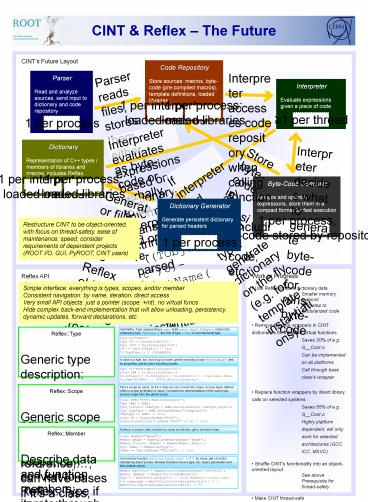CINT - PowerPoint PPT Presentation
1 / 1
Title:
CINT
Description:
Replace function wrappers by direct library calls on selected systems ... Generator fills dictionary data into Reflex objects, stores them as .root file ... – PowerPoint PPT presentation
Number of Views:53
Avg rating:3.0/5.0
Title: CINT
1
CINT Reflex The Future
CINTs Future Layout
Parser reads files, stores them either as
byte-code or verbally, to be interpreted or
re-parsed for template instantiation
Interpreter accesses code repository when calling
functions, including code, etc.
Interpreter evaluates expressions based on
dictionary information translates string
"((TObject)o)-gtGetName()" to a function call.
Interpreter decides what to generate byte-code
for, runs byte-code
Store byte-code in repository
If interpreter and dictionary dont know a type
generate dictionary on the fly (e.g. for template
instantiations)
Generator fills dictionary data into Reflex
objects, stores them as .root file
Restructure CINT to be object-oriented, with
focus on thread-safety, ease of maintenance,
speed consider requirements of dependent
projects (ROOT I/O, GUI, PyROOT, CINT users)
- Work In Progress
- Use Reflex to store dictionary data
- Smaller memory footprint
- First step to modularized code
- Remove function wrappers in CINT dictionaries
for inherited virtual functions - Saves 30 of e.g. G__Cont.o
- Can be implemented on all platforms
- Call through base class's wrapper
- Replace function wrappers by direct library
calls on selected systems - Saves 55 of e.g. G__Cont.o
- Highly platform dependent, will only work for
selected architectures (GCC, ICC, MSVC) - Shuffle CINT's functionality into an
object-oriented layout - See above
- Prerequisite for thread-safety
Reflex API
Simple interface everything is types, scopes,
and/or member Consistent navigation by name,
iteration, direct access Very small API objects
just a pointer (scope int), no virtual
funcs Hide complex back-end implementation that
will allow unloading, persistency, dynamic
updates, forward declarations, etc.
ReflexType Generic type description enclosing
scope can be built as sequence of pointer,
const, reference, can have bases if its a
class, can convert to a ReflexScope if its a
class, struct, or union functions also have a
type, e.g. parameters, return type, constness
Get ReflexType representing a char, build const
char. ToType() returns the underlying type,
TypeType() the kind of type char is a
fundamental type.
Type tC("char") Type tCC ConstBuilder(tC) Ty
pe tPCC PointerBuilder(tCC) tCC
tPCC.ToType() // true tC.TypeType() //
FUNDAMENTAL
ReflexScope Generic scope description
enclosing scope can convert to a ReflexType if
its a class, struct, or union allows access to
enclosed scopes, types, members
ReflexMember Describe data and function
members iterate through them, get their types,
for functions access list of parameters, get the
return type
Member mSetTitle sNamed.FunctionMemberByName(
"SetTitle") Member iMember sNamed.FunctionMembe
rAt(0) Type t mSetTitle.GetType() // (void
TNamed)(const char) int numparams
mSetTitle.FunctionParameterSize() //
1 mSetTitle.FunctionParameterDefaultAt(0) // ""
Get member function SetTitle(const char t"") by
name, get a function member by direct access.
Member functions have a type, too. Query
parameters and their default values.































